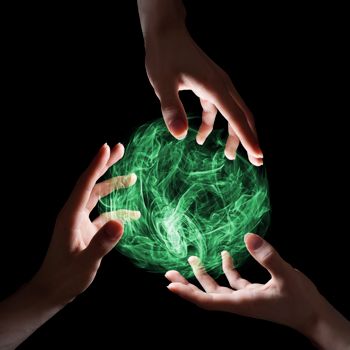A magazine where the digital world meets the real world.
On the web
- Home
- Browse by date
- Browse by topic
- Enter the maze
- Follow our blog
- Follow us on Twitter
- Resources for teachers
- Subscribe
In print
What is cs4fn?
- About us
- Contact us
- Partners
- Privacy and cookies
- Copyright and contributions
- Links to other fun sites
- Complete our questionnaire, give us feedback
Search:
The Sorceror’s Apprentice 2.0
by Howard Williams, Queen Mary University of London

A good magic trick makes you feel like you’ve just witnessed a miracle. An impossible event has occurred right in front of you. Most magical effects are simple to experience, but a fiendish complexity lies behind the scenes that is hard to work out. The methods behind some of the best tricks are so complex no-one would ever believe the magician would go to such enormous lengths to pull off such a simple seeming trick. Magicians will do almost anything to make you gasp in wonder, and go to similar lengths to prevent you finding out how they did it!
Magicians constantly look for new ways to wow an audience. They often head the queue to try out new technology, and often invent things to use in tricks that go on to be used elsewhere. Magicians were involved in the birth of cinema, exploiting and refining the ways film could be edited and manipulated to create magical movies. Today's blockbuster special effects are the end product of this on-screen conjuring.
At Queen Mary University of London we've been turning our coding skills towards making new magic tricks using Artificial Intelligence techniques from our labs. Artificial Intelligence (AI to us geeks!) isn't just a Steven Spielberg movie, but a whole field of Computer Science. It's dedicated to finding ways to make computers intelligent: to program computers to give them ever more sophisticated ways to solve problems and discover new information from huge amounts of data. Soon, artificial intelligences will be driving cars on our streets (they already fly planes in our skies!), cleaning our houses, running our home's heating systems, possibly even being our friends or work colleagues!
With a little help from in-the-know magicians, who have revealed some of their arcane secret methods, our researcher team have created what could one day be the ultimate sorcerer's apprentice: a computer program that suggests new magic tricks.
Computers are far better than humans at doing sums incredibly quickly, and storing huge amounts of information without ever forgetting it. As a result, they are exceptionally good at picking out patterns where, to the human brain, there don't seem to be any. They can direct all their number crunching abilities at complex problems that would otherwise take humans years or even centuries to complete. For example, computers are currently used in medicine to help scientists understand how DNA works. They sift through the billions of ways in which different bits of DNA interact to cause all sorts of changes in human bodies. These same pattern finding abilities of AIs can be used to sift through the various ways to build magic tricks and find the ones that work the best.
The sorcerer's apprentice is fed with lots of information about how we perceive the world. Based on that information it churns out new magical methods, leading to new tricks, that should amaze an audience in the best way possible. It's a program that is able to find the very best version of a trick at the click of a button!
Amongst the recent tricks it has come up with are a magical jigsaw puzzle, and an astounding card trick during which a mobile phone reads the mind of a spectator. All the cunning of a magician's mind is needed to know what will fool real people - but it takes a clever AI to figure out the ultimate way to really confound them. When performed well, the tricks really do leave the spectator thinking a miracle has occurred. We know this because, being scientists, we tested the tricks out to see how mystifying they were! Result: very!
We may prefer to have an actual person perform the magic for us (though robot magicians are just around the corner too), but what magician wouldn't want a handy AI assistant around to help them craft their next masterpiece? The audience need never know!


